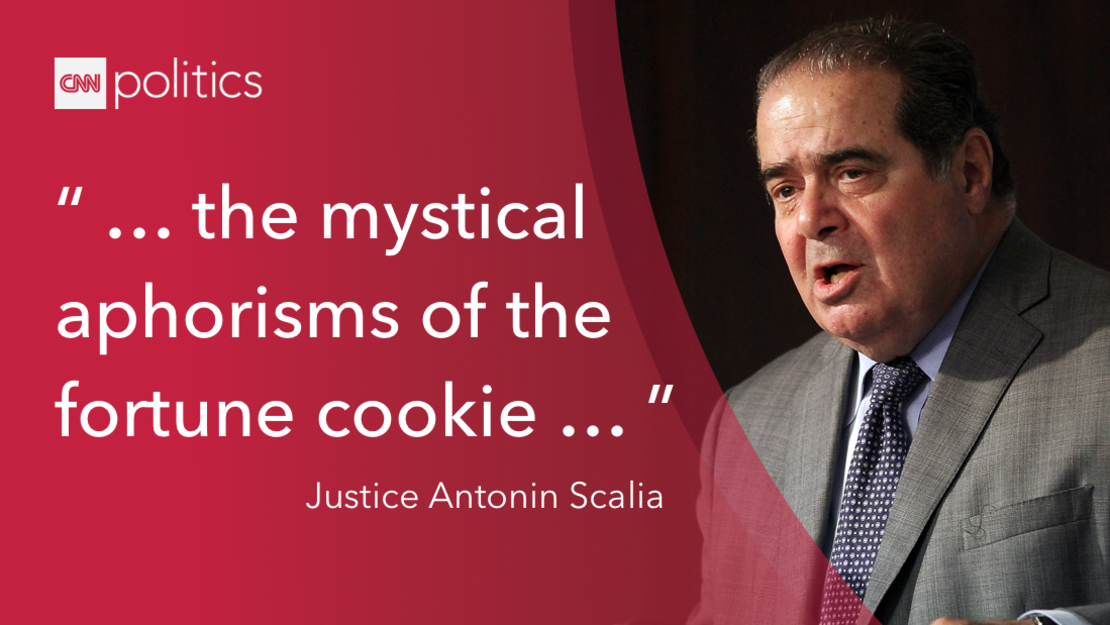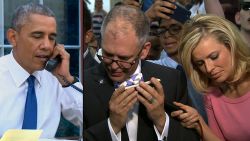In a historic 5-4 ruling, the Supreme Court of the United States struck down same-sex marriage bans across the country.
Justice Anthony Kennedy voted to affirm that same-sex marriage is a right along with the other four liberal justices and read the Court’s opinion.
Chief Justice Johns Roberts dissented, along with Justice Clarence Thomas, Justice Samuel Alito and Justice Antonin Scalia each wrote their own dissenting opinion.
Read the Supreme Court’s full decision
Here are some highlights from the Court’s opinion, as read by Kennedy:
1. “No union is more profound than marriage, for it embodies the highest ideals of love, fidelity, devotion, sacrifice and family. In forming a marital union, two people become something greater than they once were.”
2. “The nature of marriage is that, through its enduring bond, two persons together can find other freedoms, such as expression, intimacy, and spirituality. This is true for all persons, whatever their sexual orientation.”
3. “It would misunderstand these men and women to say they disrespect the idea of marriage. Their plea is that they do respect it, respect it so deeply that they seek to find its fulfillment for themselves. Their hope is not to be condemned to live in loneliness, excluded from one of civilization’s oldest institutions. They ask for equal dignity in the eyes of the law. The Constitution grants them that right
4. “The right of same-sex couples to marry that is part of the liberty promised by the Fourteenth Amendment is derived, too, from that Amendment’s guarantee of the equal protection of the laws.”
READ: Supreme Court rules in favor of same-sex marriage
A key theme for Kennedy is how marriage impacts children:
5. “A third basis for protecting the right to marry is that it safeguards children and families and thus draws meaning from related rights of childrearing, procreation, and education.”
6. “As all parties agree, many same-sex couples provide loving and nurturing homes to their children, whether biological or adopted. And hundreds of thousands of children are presently being raised by such couples.”
7. “Without the recognition, stability, and predictability marriage offers, their children suffer the stigma of knowing their families are somehow lesser. They also suffer the significant material costs of being raised by unmarried parents, relegated through no fault of their own to a more difficult and uncertain family life. The marriage laws at issue here thus harm and humiliate the children of same-sex couples.”
8. “This does not mean that the right to marry is less meaningful for those who do not or cannot have children. Precedent protects the right of a married couple not to procreate, so the right to marry cannot be conditioned on the capacity or commitment to procreate.”
U.S. reacts to same-sex marriage ruling
The conservative response from Scalia
Each of the four conservative justices wrote their own dissent but Justice Antonin Scalia’s is the most blistering.
1. “The Supreme Court of the United States has descended from the disciplined legal reasoning of John Marshall and Joseph Story to the mystical aphorisms of the fortune cookie.”
2. “I write separately to call attention to this Court’s threat to American democracy.”
3. “The substance of today’s decree is not of immense personal importance to me … It is of overwhelming importance, however, who it is that rules me. Today’s decree says that my Ruler, and the Ruler of 320 million Americans coast-to-coast, is a majority of the nine lawyers on the Supreme Court.”
4. “Until the courts put a stop to it, public debate over same-sex marriage displayed American democracy at its best. The five Justices who compose today’s majority are entirely comfortable concluding that every State violated the Constitution for all of the 135 years between the Fourteenth Amendment’s ratification and Massachusetts’ permitting of same-sex marriages in 2003.”
5. “Who ever thought that intimacy and spirituality [whatever that means] were freedoms? And if intimacy is, one would think Freedom of Intimacy is abridged rather than expanded by marriage. Ask the nearest hippie. Expression, sure enough, is a freedom, but anyone in a long-lasting marriage will attest that that happy state constricts, rather than expands, what one can prudently say.”

Scalia’s language has changed over the years
CNN Senior Legal Analyst Jeff Toobin points out that Scalia’s tone on homosexuality has changed in the ten years since he dissented in another opinion that Kennedy read - the case of Lawrence v. Texas in which the Court ruled that gay people could not be criminally prosecuted for having sex.
“Many Americans do not want persons who openly engage in homosexual conduct as partners in their business, as scoutmasters for their children, as teachers in their children’s schools, or as boarders in their home,” Scalia wrote in 2003. “They view this as protecting themselves and their families from a lifestyle that they believe to be immoral and destructive.”
This time around, Scalia started his dissent by saying that he takes issue with the Democratic process, instead of focusing on homosexuality itself.
“[Scalia] cannot talk the way he used to talk about gay people,” Toobin said, “because culturally, politically, even legally, it’s simply not appropriate.”
READ: First on CNN: Ken Mehlman calls SCOTUS decision “historic”




































